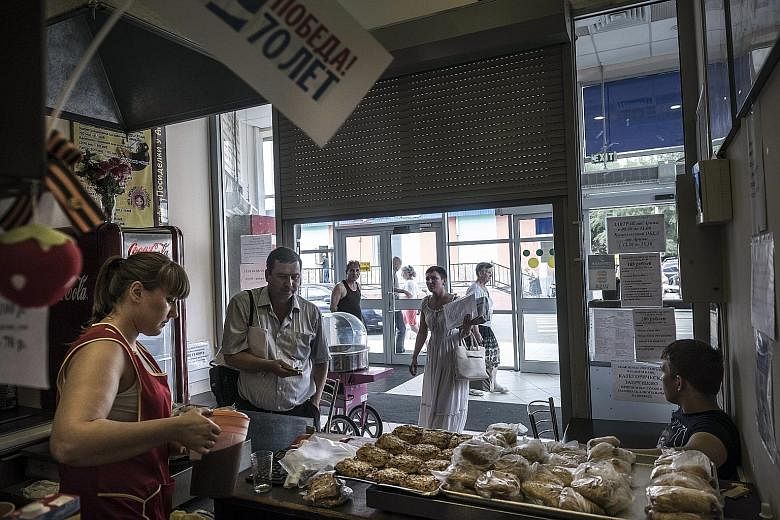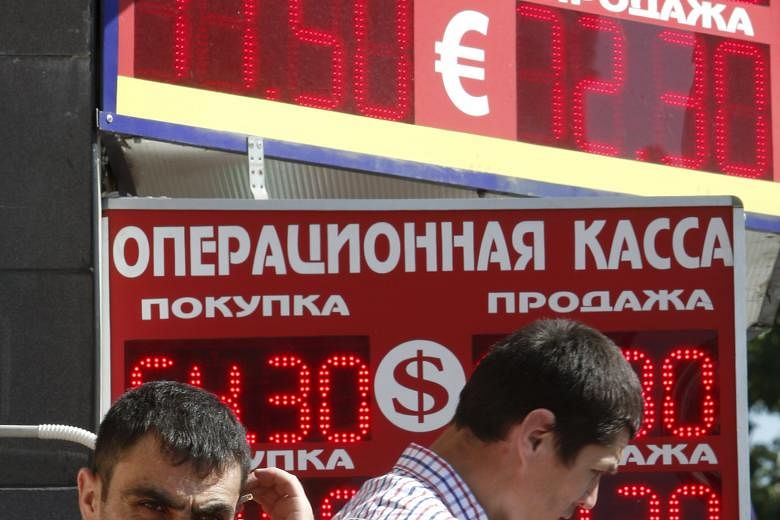RAMENSKOYE (Russia) • A basic barometer of economic activity in this town south of Moscow is the pirozhok, a small pie filled with cabbage and meat that is a staple of the Russian diet.
In good times, they sell briskly to hungry commuters at Arina's Hangout, a tiny shop near the train station. But sales are down by almost half, a gloomy reflection of Russia's economic slump.
"We used to have lines. Now look at it," said its owner, Ms Irina Safonova, looking at a trickle of customers.
Russians are experiencing the first sustained decline in living standards in the 15 years since President Vladimir Putin came to power. The rouble has fallen by half against the US dollar, driven by the plunging price of oil - the lifeblood of Russia's economy. As a result, prices of imported goods have shot up.
Making matters worse are the retaliatory bans that Russia placed on food imports after the United States and European Union imposed sanctions for its actions in Ukraine, a policy that took a turn for the weird this month when the government destroyed thousands of tonnes of what it said were illegally imported foodstuffs, including cheese and peaches.
The reduced supply means what remains costs more, even if it is locally produced. The sanctions have also driven up the cost of borrowing for Russian firms but they have not had a direct role in the inflation that is raiding Russian pocketbooks.
Inflation has reduced the purchasing power of Russian wages by more than 8 per cent in the second quarter, compared with the same period last year, according to Russia's central bank at the end of last month. And in a sign that the worst is far from over, the economy contracted by 4.6 per cent in the second quarter, compared with last year, and entered its first recession since 2009.
-
•The Russian economy contracted by a steep 4.6 per cent in the second quarter, compared with last year, and officially entered its first recession since 2009.
•Inflation has reduced the purchasing power of Russian wages by more than 8 per cent in the second quarter, compared with the same period last year.
•The rouble has fallen by half against the US dollar, driven by the plunging price of oil.
•Prices of imported goods have shot up, making tea, instant coffee, children's clothes jarringly expensive.
•Nescafe went to 389 roubles (S$8.30) from 220 roubles and Ahmad Tea to 319 roubles from 191.
•Russians are paying a third more for sunflower oil, a fifth more for yogurt and three-quarters more for carrots, compared with a year ago, according to government statistics.
•International airline travel has fallen almost a fifth since last year, and car sales are down 36 per cent in the first half of this year.
•The production of train cars fell by a third because fewer goods needed to be transported.
NEW YORK TIMES
Across Russia, the crisis has prompted a collapse in consumption. Household debt is up 43 per cent since July last year, according to the central bank.
"It's horrible," said shoe saleswoman Elena Shcherbakova, 47, whose income, based partly on commissions, has fallen nearly a third since last year.
It is not clear what this means for Mr Putin. The trouble pales in comparison with the turbulent 1990s, when wages went down by nearly half. Russians have an immense capacity for stoicism, and ubiquitous home gardens make budgets more flexible. Mr Putin's popularity has remained high since last year's wildly popular annexation of Crimea.
Still, the maths is proving tricky. In a new draft Budget released last month, the Ministry of Finance proposed halting the practice of raising pensions to keep up with inflation, a move that would deliver a blow to Mr Putin's most loyal base. Investment - the food for a hungry economy - has collapsed since sanctions were imposed. That has also blocked Russia's ability to borrow globally.
Mr Putin's opponents argue that current nationalist talk is being projected to distract attention from the fragile economic situation. They describe it as a battle between the television -the source of government propaganda - and the refrigerator, whose shrinking contents could eventually prompt discontent.
In Moscow, some in the educated upper classes agree.
"All that Ukrainian noise covers up our internal problems," said Ms Maria Novychkova, a manager in a textile company. Her company has put employees on a four-day work week. She cannot afford to holiday abroad because of the weak rouble.
The town of Ramenskoye tried to modernise in recent years, with an airport for private jets and a PepsiCo juice factory. It is also a dormitory for Moscow.
Commuters are Ms Safonova's main customers. She first noticed a drop in business late last year. Fewer commuters spent less freely. Checkout clerks at the supermarket had their wages cut. PepsiCo closed the juice factory, citing the economy. Prices began jumping.
Ms Safonova knew about the sanctions, and that the falling rouble made imports more expensive. But a spike in the price of mushrooms was puzzling. "I said, 'Why, why?' These are grown near Moscow, not in Europe!"
Ms Safonova has laid off four of her eight employees .
"I'm sick of Crimea," the cashier at Arina's Hangout, Ms Alexandra Vasilieva, said. "I'm sad for the people," she said, referring to Ukrainian refugees, "but why are they getting all this government assistance?"
NEW YORK TIMES


